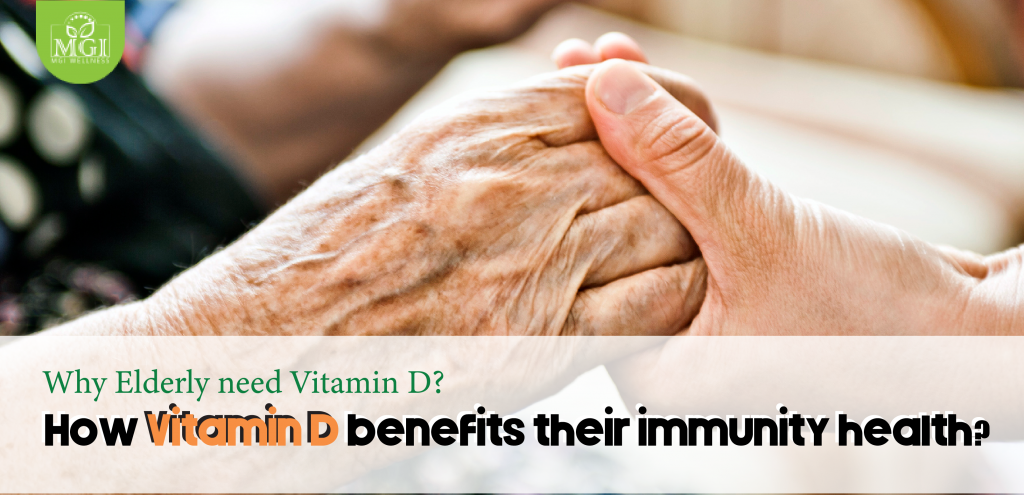Wellness
Why Elderly need Vitamin D?
Why Elderly need Vitamin D?
.
Vitamin D is vital to the health and well-being of older adults. Despite the universal need for Vitamin D, older populations worldwide experience Vitamin D deficiency in high numbers. In other words, as individuals age, the risk of vitamin D deficiency increases.
.
This might be due to older adults tend to spend the majority of their time indoors and get minimal exposure to natural sunlight. Moreover, as the skin thins with age, Vitamin D synthesis becomes much less efficient. Reduced appetite and impaired absorption of nutrients further compound this problem for seniors.
Benefits of Vitamin D for Elderly
- Bone health
Vitamin D is important for strong bones and muscles. It helps to prevent the bone disease osteoporosis, a condition that causes bones to become brittle and weak. Without Vitamin D, our bodies cannot effectively absorb calcium, which is essential to good bone health. Low Vitamin D levels contribute to an increased risk for falls, fractures, poor physical balance and muscular weakness.
.
A 2019 American Medical Association analysis of 49,000 found seniors who combined adequate vitamin D levels and sufficient calcium intake reduced their risk of hip fractures by 16%. (1) Another study showed hip fractures are reduced by 20% in elderly who take 400 IU of Vitamin D supplements daily.(2)
.
- Immune health
Immune functions naturally deteriorate as people age. Thus, the elderly tend to have weakened immunity. Vitamin D can help to boost seniors’ immune systems to fight against illnesses like flu, colds and other respiratory conditions.
.
A 2017 meta-analysis of data from 25 randomized clinical trials reported that vitamin D promotes “natural antibiotic-like substances” in the lungs and protect against acute respiratory infections like colds and flu. (3)
.
- To boosts elderly happiness and mental health
Low levels of Vitamin D may contribute to poorly regulated mood and behavior, impair cognitive function, poor brain health and depression. Vitamin D is believed to help regulate the release of neurotransmitters (dopamine, serotonin) in the brain that influence moods/ happiness. Seniors who feel depressed and tired all the time may actually suffer from vitamin D insufficiency or deficiency.
.
A 2017 study of more than 5,600 older adults found a link between lower levels of vitamin D and depressive symptoms, such as loneliness, lack of enjoyment, and restless sleep. (4) Meanwhile, a finding from a clinical trial data indicated that Vitamin D supplementation can improve the depression score in persons aged 60 and over. (5)
.
The recommended nutrient intakes (RNI) for vitamin D for Malaysian aged 1 to 70 years is 600 IU per day and 800 IU a day for adults older than 70. (6) Some ways to get the recommended dose of vitamin D for elderly are:
- Take a morning walk and get approximately 5 to 10minutes of sun exposure twice a week since sunshine is one of the best natural sources of vitamin D.
- Consume vitamin Drich food sources such as tuna, sardines, mackerel, salmon, mushrooms and eggs.
- Taking health supplement products with an adequate amount of vitamin D might be needed by elderly in maintaining an optimal Vitamin D level.
In conclusion, Vitamin D is important in creating a healthy immune system and strong bones. Vitamin D deficiency in elderly may trigger severe health problems like osteoporosis, increases risks of fractures/ falls, fatigue, pain and depression. Therefore, it is important to ensure that elders obtain enough vitamin D to stay healthy.
–
References:
- Yao P, Bennett D, Mafham M, et al. Vitamin D and Calcium for the Prevention of Fracture: A Systematic Review and Meta-analysis. JAMA Netw Open. 2019;2(12):e1917789. doi:10.1001/jamanetworkopen.2019.17789
- Heike A Bischoff-Ferrari, et al. Prevention of nonvertebral fractures with oral vitamin D and dose dependency: a meta-analysis of randomized controlled trials. Arch Intern Med. 2009 Mar 23;169(6):551-61.
- Adrian R Martineau, et al. Vitamin D supplementation to prevent acute respiratory tract infections:
systematic review and meta-analysis of individual participant data. BMJ 2017;356:i6583
- Cesar de Oliveiraet al. Associations Between Vitamin D Levels and Depressive Symptoms in Later
Life: Evidence From the English Longitudinal Study of Ageing (ELSA). The Journals of Gerontology: Series A, Volume 73, Issue 10, October 2018, Pages 1377–1382
- Negin et al. Effect of vitamin D supplementation on depression in elderly patients: A randomized
clinical trial. Clin Nutr. 2019 Oct;38(5):2065-2070
- Recommended Nutrient Intakes Malaysia 2017
Health Food


